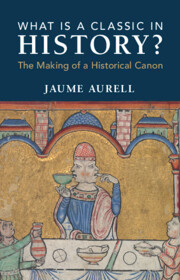Refine search
Actions for selected content:
3 results
Chapter 3 - After and Beyond Vico
-
- Book:
- Vico and the Maker's Knowledge Tradition
- Published online:
- 27 June 2025
- Print publication:
- 17 July 2025, pp 88-117
-
- Chapter
- Export citation
Chapter 5 - The Friendly Word
-
- Book:
- Auerbach's Renaissance
- Published online:
- 24 April 2025
- Print publication:
- 24 April 2025, pp 116-152
-
- Chapter
- Export citation

What Is a Classic in History?
- The Making of a Historical Canon
-
- Published online:
- 15 February 2024
- Print publication:
- 22 February 2024
